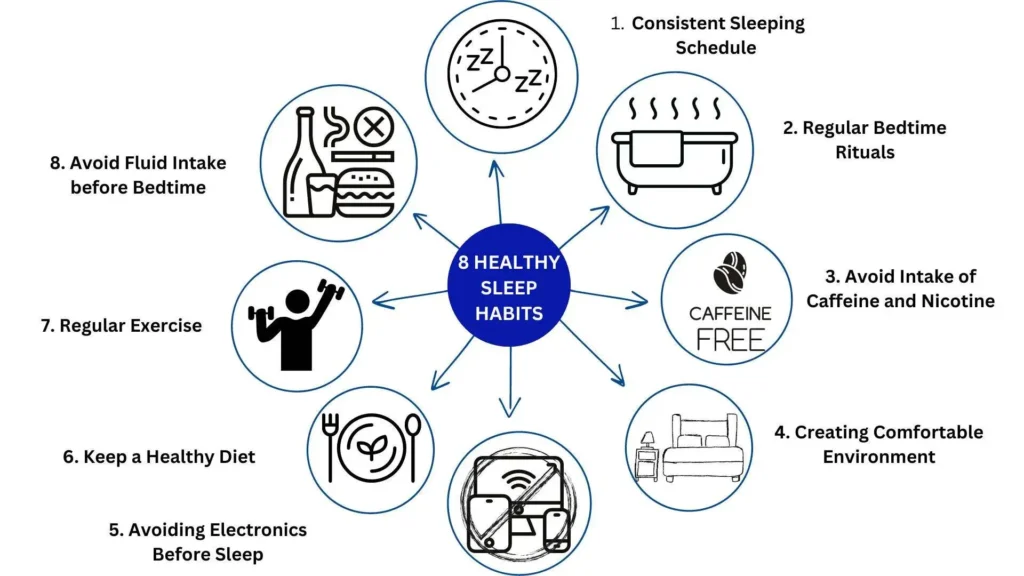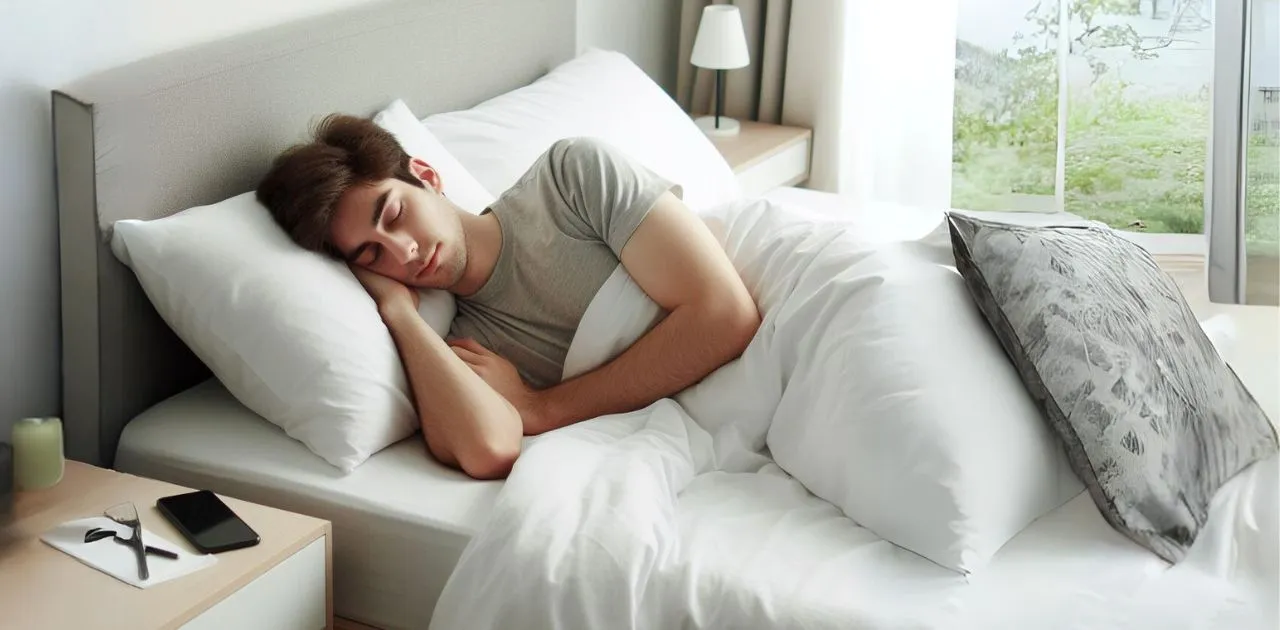Imagine waking up each day feeling healthy, fresh and with a fully recharged mind. Then, you will be ready to conquer the world. The secret to this vitality lies in the power of healthy sleep habits.
Understanding the essential practices that help you sleep well, from creating a consistent sleep schedule to crafting a peaceful bedtime routine, is important for a better life.
This guide unveils transformative practices that can turn your nights into a sanctuary of rest and renewal. Embark on this journey to better sleep and wake up to a brighter, more vibrant life.
Table of Contents
8 Healthy Sleeping Habits
Following are 8 best sleep habits that can help you find ways to improve sleep patterns. These good sleep habits are:

1. Consistent Sleep Schedule
A consistent sleep schedule refers to going to bed and waking up at the same time every day, including weekends. This regularity, known as circadian rhythm, helps regulate your body’s internal clock. This internal clock influences sleep-wake cycles, hormone release, and other body functions.
Certain important factors also allow you to follow this habit. These include enhanced daytime alertness, which means that daytime sleepiness is reduced and that cognitive function, mood, and overall performance improve.
Regular sleep also helps manage stress, anxiety, and depression by maintaining stable mood-regulating hormones. Good sleep schedule prioritizes sleep which is one of the healthy habits for the holidays.
Moreover, regular sleep patterns help you fall asleep faster and enjoy deeper, more restorative sleep. It also supports immune function and reduces the risk of chronic diseases.
You can develop a consistent sleep schedule by:
- Selecting a fixed bedtime and wake-up time
- Establishing a relaxing pre-sleep routine
- Optimizing your sleep environment
- Engaging in more activities during the day
- Getting exposure to natural light
2. Regular Bedtime Rituals
Bedtime rituals are consistent, relaxing activities performed in the same order every night before bed. These routines help signal your mind and body that it’s time to wind down and prepare for sleep, creating a smoother transition from wakefulness to sleepiness.
Every habit you develop has certain important aspects. A regular bedtime ritual is a healthy sleep habit that enhances the quality of your sleep and establishes a consistent sleep schedule, which is crucial for maintaining your body’s internal clock.
Furthermore, good sleep hygiene, accompanied by bedtime rituals, aids in better physical health, mental well-being, and cognitive functions. Regular bedtime rituals also help create a predictable pattern that helps your body recognize when it’s time to sleep.
The best time to start your routine is 30-60 minutes before bedtime. You can develop bedtime rituals by adopting the following habits:
- Taking a warm bath or shower that helps you reduce the temperature of your body
- Doing some gentle stretches or yoga exercises that help relax your muscles
- Meditating as it helps you calm your mind
- Spending some time reading a book and avoiding digital reading
It is crucial to avoid excessive exercise and bright artificial light, as they may signal the brain that it is time to be awake. In the National Library of Medicine, biotech information scientists have found that mimicking a nighttime drop in body temperature via a warm bath can trigger a similar sleepy reaction.
3. Avoid Intake of Caffeine and Nicotine
Avoiding caffeine and nicotine means reducing or eliminating their intake, particularly in the hours leading up to bedtime. Caffeine is a stimulant found in coffee, tea, chocolate, and many soft drinks, while nicotine is a stimulant found in tobacco products.
Both nicotine and caffeine can cause stress and anxiety, and they are also stimulants that can affect your sleep patterns. Therefore, by avoiding caffeine and nicotine intake, one gets a calmer and more relaxed state before bedtime.
It also helps prevent disruptions at night, allowing for longer periods of uninterrupted sleep. Avoiding caffeine or nicotine can also help you fall asleep faster and reduce the time it takes to transition between wakefulness and sleep.
Similarly, avoiding caffeine improves sleep habits to reduce migraine.
Frontiers in Psychiatry has published research which states that the effects of caffeine can last 3-7 hours after you consume it. Hence, it is necessary to avoid its intake to help sleep better at night. You can reduce the intake of nicotine and caffeine in the following ways:
- Tracking your consumption history and sources of consumption
- By setting clear goals of cutting its intake slowly rather than quitting abruptly
- Find suitable alternatives such as decaffeinated coffee or tea
- For a smoker, it is recommended to use nicotine replacement therapy (NRT)
- Join support groups or forums for individuals who are trying to quit caffeine and nicotine
4. Keep a Healthy Diet
A healthy diet means consuming a balanced intake of nutrients, including vitamins, minerals, proteins, fats, and carbohydrates, at regular intervals throughout the day. A balanced diet should include different types of foods from all food groups to support health and well-being, which in turn can improve sleep quality.
Research published in Cambridge University Press states that eating a large amount of food before bed may negatively affect sleep quality. It may also cause symptoms of acid reflux, which can lead to a state of wakefulness. So, keeping a healthy diet and minimizing the intake of food before bed can have certain positive effects.
Proper nutrition is essential for overall health, as it is helpful in reducing the risk of chronic diseases that can affect sleep, such as obesity, diabetes, and heart disease. Also, by consuming balanced meals and snacks, blood sugar levels are maintained, which ultimately prevents nightmare wakening due to a drop in sugar levels.
There are certain ways to develop the habit of keeping a healthy diet for sleep. These are:
- Planning balanced meals by ensuring your meals include a balance of proteins, healthy fats, carbohydrates, and plenty of fruits and vegetables
- Focusing on sleep-rich nutrients, such as food rich in magnesium and calcium, consuming food rich in vitamin B, and eating foods high in tryptophan, which can help produce serotonin and melatonin
5. Create a Comfortable Environment
Creating a comfortable sleep environment involves setting your bedroom to promote relaxation and restfulness. This includes controlling lighting, temperature, noise levels, and bedding to create an atmosphere conducive to falling and staying asleep.
Creating a comfortable environment is one healthy sleeping habit. Its important aspects include enhanced sleep quality. Properly controlled lighting, temperature, and noise levels can minimize disturbances that might wake you up at night.
Moreover, a calming bedroom environment can reduce stress and anxiety, making it easier to relax during bedtime. Creating an optimal sleep environment also increases the likelihood of staying asleep longer and feeling refreshed.
Besides this, better sleep quality and duration contribute to improved physical health and cognitive functionality. However, an uncomfortable environment can cause insomnia. For example, researchers are still studying whether medieval sleeping habits can fix America’s insomnia, which is caused by environmental factors.
The habit of creating a comfortable environment for sleeping can be done in the following ways:
- Firstly, optimize bedroom lighting, such as dimming the light in the evening to signal your body that it’s time to sleep, installing blackout curtain, and using soft, low-wattage night lights if needed
- Secondly, maintain the room temperature to around 16-19°C which is considered optimal for sleeping
- Then, manage noise levels by using rugs, curtains or other sound-absorbing materials to reduce the noise. Even a white noise machine may help you sleep without disruption.
- Additionally, you could choose comfortable bedding by investing in a good-quality pillow and mattress. Also, keep your bedroom near and tiday for a relaxing environment.
6. Avoiding Electronics Before Sleep
Avoiding electronics before sleep means refraining from using mobile phones, televisions, laptops and tablets for some time before bedtime. This practice aims to reduce exposure to blue light emitted by screens and minimize mental stimulation, promoting better sleep quality.
The importance of avoiding blue light exposure includes minimizing exposure to blue light as it interferes with the production of harmone known as melatonin, which regulates the sleep-wake cycle. When a person engages in electronics, their mind remains active and alert, making it difficult to unwind and relax before bed.
Avoiding electronics is one of the important healthy sleep habits. It allows you to engage in more calming activities that prepare your mind and body for sleep. Reducing evening screen time also helps establish a regular bedtime routine, supporting a consistent sleep schedule.
Certain ways can help you avoid electronics before sleep and build healthy social media habits; these are:
- Setting a cut-off time, such as choosing a specific time each evening, like 30-60 minutes before bedtime
- By creating a relaxing pre-sleep routine, such as reading a physical book, engaging in meditation, or spending a few minutes writing a journal
- By engaging in non-screen activities, such as non-electronic puzzles, board games, or activities like knitting or drawing
- By encouraging family participation in family gatherings, discussions, or playing games together
7. Regular Exercise
Regular exercise refers to consistently engaging in physical activity, typically involving aerobic, strength, and flexibility exercises. Developing regular exercise as a habit is a good sleep habit. It promotes overall health and well-being and significantly contributes to better sleep quality and duration.
Regular exercise is important for better sleep in various ways. Exercise can reduce symptoms of insomnia and other sleep disorders by decreasing anxiety and promoting relaxation. Consistent exercise also helps regulate your body’s internal clock.
Furthermore, people who exercise regularly tend to sleep longer and have fewer disruptions during the night. Similarly, exercise boosts daytime energy levels and reduces fatigue, contributing to a more balanced sleep-wake cycle.
There are certain ways to develop the habit of regular exercise for sleep; these are:
- Setting realistic goals, such as beginning with small manageable goals, like a 10-minute walk every day and also keeping consistent
- Choosing enjoyable activities such as dancing, yoga, swimming, drawing, or cycling to make it easier to stick to a routine
- Set a specific time each day for exercise, and avoid extensive exercise close to bedtime as it can increase alertness.
- Take breaks to stretch or walk during the day, such as using stairs instead of elevators and incorporating movements into daily tasks.
8. Avoiding Fluid Intake Before Bedtime
Avoiding fluid intake before bedtime means limiting liquid consumption, particularly in the last hour or two before sleep. This practice reduces the likelihood of waking up during the night to urinate, thereby promoting healthy sleep.
Alcohol acts as a sedative, reducing brain activity. Although it can help you fall asleep initially, it disrupts your sleep throughout the night, leading to frequent awakenings and possible nightmares. To avoid these issues, it’s advisable to abstain from drinking alcohol for at least four to six hours before going to bed.
Consistent, high-quality sleep is essential for various aspects of health, including cognitive function, immune response, and emotional well-being.
Minimizing fluid intake before bed helps prevent the need to wake up during the night to go to the bathroom. You can enjoy a longer duration of healthy sleep by not having to get up multiple times at night.
Moreover, frequent nighttime urination, or nocturia, can be a contributing factor to sleep disorders. Managing fluid intake can help mitigate this issue.
The following are a few ways to develop the habit of avoiding fluid intake before bedtime:
- Decide on a specific time to stop drinking fluids, typically 1-2 hours before bedtime.
- Keep a log of your fluid intake throughout the day to ensure you hydrate adequately in the morning and afternoon.
- Reduce the consumption of alcohol and caffeine, especially in the hours leading up to bedtime, as these can increase urine production.
- If you enjoy drinking tea or water in the evening, switch to smaller cups or drink them earlier.
What are the Healthy Sleep Habits for Adults?
Healthy sleep habits are essential for adults to achieve restful and restorative sleep. Essential habits for better sleep involve sticking to a regular sleep schedule, establishing a calming bedtime routine, and enhancing your sleep environment by ensuring the bedroom is cool, quiet, and dark.
Regular exercise, mindful eating, and limiting fluid intake before bed also improve sleep quality. Reducing exposure to electronics and managing stress through relaxation techniques can help ease the transition to sleep.
Conclusion
Healthy sleep habits are vital for adults to achieve restful and restorative sleep. Key practices that help individuals include maintaining a consistent sleep schedule, creating a relaxing environment for sleep, optimizing the sleep environment, reducing fluid intake before bedtime to help better sleep without disruptions, and developing a habit of regular exercise.
Integrating these habits into daily life can significantly improve sleep quality and well-being. If sleep issues persist, seeking professional help is essential to address potential underlying disorders.
FAQs
What is meant by 10 3 2 1 0 rule for sleep?
The 10-3-2-1-0 rule is a simple guideline to enhance sleep quality. It suggests stopping caffeine intake 10 hours before bed, avoiding food and alcohol 3 hours before bed, ceasing work 2 hours before bed, and turning off screens 1 hour before bed. Additionally, it encourages waking up without hitting the snooze button. By following these steps, individuals can create a structured routine that promotes better and more restful sleep.
Which is better, REM or deep sleep?
REM (rapid eye movement) and deep sleep are essential sleep cycle stages, serving different but equally vital functions. REM sleep aids in memory consolidation, emotional regulation, and cognitive processing, which is crucial for learning and problem-solving.
Conversely, deep sleep, characterized by slow brainwaves, facilitates physical restoration, including muscle repair and immune function, and supports memory consolidation, particularly for factual information and procedural memory.




